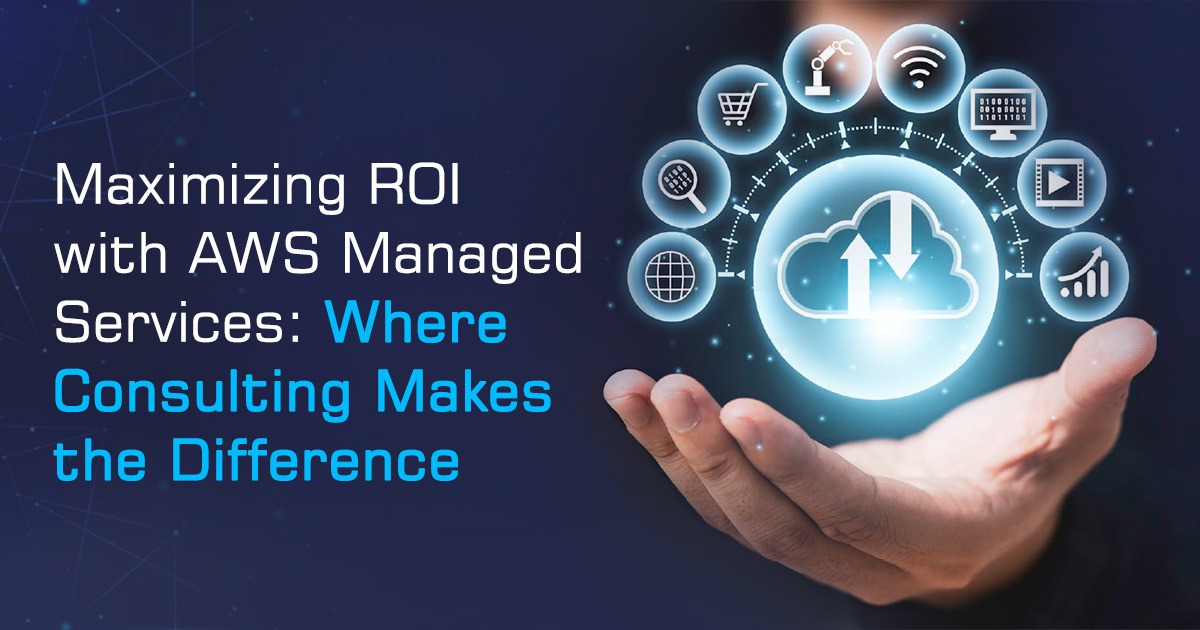
Maximizing ROI with AWS Managed Services: Where Consulting Makes the Difference
As technology continues to reshape every industry, businesses are increasingly turning to the cloud to stay ahead. Amazon Web Services (AWS) has become a top choice because it offers powerful tools and solutions to store data, run applications, and manage infrastructure. However, using AWS efficiently and getting the best return on your investment (ROI) is not always easy—especially if you don’t have in-house cloud experts.
That’s where AWS Managed Services and cloud consulting come into play. Together, they help businesses not only migrate to AWS but also run operations smoothly, reduce costs, and grow faster. In this article, we’ll explain what AWS Managed Services are, how they help maximize ROI, and why the right consulting partner makes all the difference.
What Are AWS Managed Services?
AWS Managed Services (AMS) are services provided by AWS or AWS-certified partners to help you manage your cloud infrastructure. These services include:
Monitoring and security
Automated backups and recovery
Infrastructure maintenance
Cost optimization
Compliance management
In simple terms, AWS Managed Services allow your business to use AWS without having to manage everything yourself. You can focus on your core business while experts take care of your cloud systems.
How AWS Managed Services Help Improve ROI
1. Lower Operational Costs
Hiring and maintaining a full-time IT team to manage cloud operations can be expensive. With managed services, you pay only for what you use. This cuts down fixed costs and avoids the need for hiring more staff.
Also, automated processes reduce manual work. For example, automatic patching, backup, and scaling help your business save time and avoid costly mistakes.
2. Enhanced Security and Compliance
Data breaches or compliance failures can result in huge losses. AWS Managed Services provide 24/7 monitoring, automated security updates, and tools to meet industry regulations (like GDPR, HIPAA, etc.).
This reduces the risk of security issues, builds customer trust, and protects your reputation—making your investment safe and worthwhile.
3. Better Performance and Uptime
Slow websites or application downtime can drive customers away. With AMS, your infrastructure is monitored continuously, and any issues are solved quickly. With built-in redundancy and high availability, your systems are always running smoothly, leading to a better customer experience and increased business.
4. Scalability Without Hassle
As your business grows, you need more resources. AWS Managed Services offer automatic scaling based on your traffic and usage. This means you won’t be paying for unused capacity during low-traffic times, and you’ll be ready to handle peak traffic when needed.
This balance directly impacts ROI—less waste, more value.
The Role of Consulting: Where It Makes the Real Difference
While AWS offers powerful tools, not every business knows how to use them effectively. That’s where cloud consultants come in. Here’s how they make a real difference:
1. Right Strategy, Right Start
Consultants begin by understanding your business goals. They help you decide:
What to move to AWS
When and how to migrate
Which AWS services to use
How to keep costs under control
This step is crucial. A bad migration can lead to poor performance and wasted money. A good consultant ensures a smooth, cost-effective start.
2. Customized Architecture
Not all businesses are the same. A retail company, a healthcare provider, and an e-learning startup all have different needs. Cloud consultants design a cloud architecture that fits your specific business—making sure you get the most out of every dollar spent.
3. Performance Tuning and Optimization
Over time, AWS usage patterns change. Consultants analyze data and make continuous improvements. This includes:
Removing unused resources
Right-sizing instances
Using cheaper storage or compute options
Recommending new AWS features that save money
These optimizations keep costs down while maintaining (or improving) performance.
4. Training and Knowledge Transfer
A good consultant doesn’t just “do the job” and leave. They train your team so you can handle more tasks on your own. This reduces future dependency and saves money in the long run.
5. Disaster Recovery and Business Continuity
Every business needs a plan for the unexpected. Consultants design backup and recovery strategies that protect your data, so your business can continue even if something goes wrong. This peace of mind is a major part of ROI.
Real-World Example
Let’s say you run a fast-growing e-commerce website. You move your website and customer database to AWS but start getting higher bills and occasional slowdowns during sales. A cloud consultant can:
Re-architect your system using auto-scaling groups
Set up alerts to avoid sudden cost spikes
Use AWS CloudFront (a content delivery network) to speed up the site globally
Enable backups and quick recovery in case of crashes
In a few months, your site loads faster, downtime is reduced, and AWS bills drop by 20–30%. That’s real ROI, made possible through expert consulting and managed services.
AWS Managed Services give your business the tools to run smoothly and securely in the cloud. But maximizing ROI requires more than just tools—it needs the right strategy. That’s where experienced cloud consultants step in. They ensure every part of your cloud journey is aligned with your business goals, optimized for cost, and prepared for growth.
So if you want to make the most of your cloud investment, don’t go it alone. Partner with a trusted AWS consultant and let them help you unlock the full potential of AWS—smartly, securely, and profitably.
